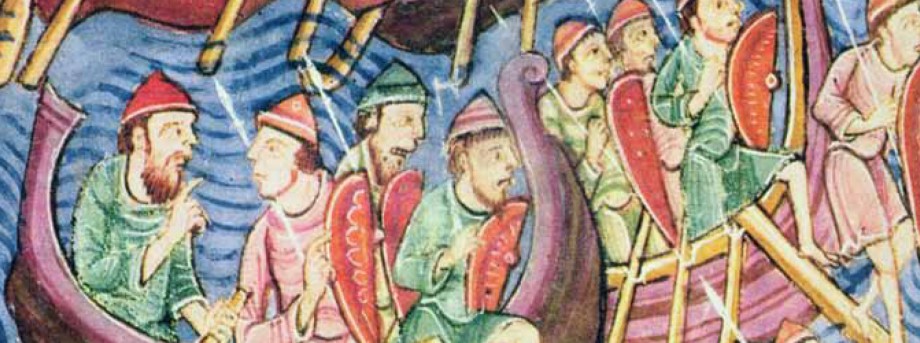The University of Nottingham
 Exchange online
Exchange online
Research Exchange
Viking poetry of love and war

They are most famous for being violent invaders of foreign shores but a new book by a University of Nottingham Viking expert shows they were also poetry lovers with a wicked sense of humour.
Viking Poetry of Love and War by Professor Judith Jesch, of the University’s Centre for the Study of the Viking Age, is the first collection in English with extracts from the full range of Viking poetry published in the UK.
The colourful volume published today by the British Museum, is an accessible introduction to the broad poetry ranges of the Vikings, from the highly formal to the light-hearted and bawdy. The selection is taken from a variety of sources from the 10th to the 13th centuries, from runes (carvings on wood, bone and stone), oral tradition and medieval manuscripts.
Professor Jesch, who translated the poems from the original Old Norse, said: “The Vikings are not often thought of as poets, though they came from a culture that valued poetry highly and rewarded poets handsomely. The themes of my selection are largely mythological, military and memorial although there is also some distinctive love poetry which encompassed both native traditions and literary influences from further south. The language is colourful, intricate and steeped in mythological knowledge.”
Some of the poems will surprise and amuse the reader — in ‘The poet is past it’, 10th century Viking poet Egill Skallagrimsson writes:
‘I’ve a crick in my neck,
and tend to fall on my head,
my trouser-snake is soft,
and my hearing’s gone away.’
Another C10th anonymous poem, ‘Ingolf is popular with the ladies’, is further evidence of a scurrilous sense of humour among the early Viking population:
All the grown girls wanted
to go with Ingolf,
those who were of age;
the wee ones were wretched.
‘I, too,’ said the old woman,
‘want to go with Ingolf,
as long as I have two teeth
still wobbling in my gums.’
A poem by Grani from the C11th, ‘King Harald feeds the beasts of battle’ is a visceral celebration of battle victory in all its gory detail:
The prince made the eaglets
a drink of Danish blood;
he made a Christmas meal
for Gudenå’s ravens;
the eagle’s children trampled
all over the corpses;
the wolf ate Jutish meat,
well may it smack its lips!
The new book includes short explanations of the ‘kenning’ in Viking poetry, a complex form of metaphorical diction that introduces new and often incongruous imagery. The narrative is also an informative guide to the contexts and forms of this large and varied body of unique ancient writing.
Viking Poetry of Love and War is illustrated with more than 50 full colour images of Viking art and runes from the British Museum collection.
Judith Jesch is Professor of Viking Studies at The University of Nottingham. Her expertise focuses on the variety of texts composed and written in Old Norse-Icelandic. She has extensive research experience in the general and cultural history of the Viking Age and the relationships of language, texts and contexts during this period.
Viking Poetry of Love and War is available from the British Museum website and other online booksellers, ISBN 978 0 7141 2830 6 PB £9.99
Tags: British Museum, Centre for the Study of the Viking Age, love, touser snake, Viking poetry, war
Leave a Reply
Other

Top prize for quantum physicist
A University of Nottingham physicist has won a prestigious medal from the Institute of Physics for […]

Zero carbon HOUSE designed and built by students comes home
Design and construct a low cost, zero carbon, family starter home, transport it to Spain, build […]